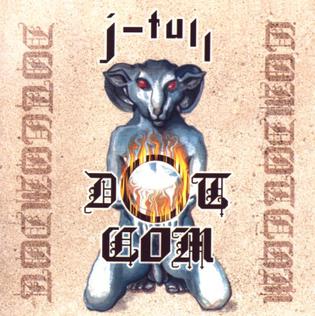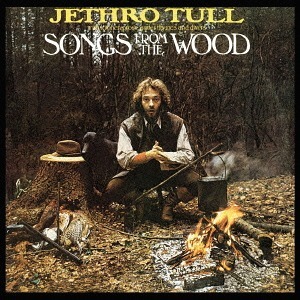
Jethro Tull are a British rock band formed in Blackpool, England, in 1967. Initially playing blues rock and jazz fusion, the band soon incorporated elements of hard rock, folk and classical music, forging a signature progressive rock sound. The group’s bandleader, founder, primary composer and only constant member is Ian Anderson, a multi-instrumentalist who mainly plays flute and acoustic guitar, and is also the lead vocalist. The group has featured a revolving door of musicians throughout the decades, including significant contributors such as electric guitarist Martin Barre, keyboardists John Evan, Dee Palmer, Peter-John Vettese and Andrew Giddings, drummers Clive Bunker, Barrie "Barriemore" Barlow and Doane Perry, and bassists Glenn Cornick, Jeffrey Hammond, John Glascock, Dave Pegg and Jonathan Noyce.

Repeat – The Best of Jethro Tull – Vol II is a 1977 greatest hits album from Jethro Tull, featuring one track which, up to the time of this album's release, had not been issued. The album's first volume was M.U. – The Best of Jethro Tull.

A is the 13th studio album by British rock band Jethro Tull. It was released on 29 August 1980 in the UK and 1 September of the same year in the United States.

Too Old to Rock 'n' Roll: Too Young to Die! is the ninth studio album released by British band Jethro Tull, recorded in December 1975 and released in 1976. It is the first album to include bassist John Glascock who also contributes with backing vocals. Too Old to Rock 'n' Roll: Too Young to Die! is the last Jethro Tull concept album, which follows the story of Ray Lomas, an ageing rocker who finds fame with the changes of musical trends.

Ian Scott Anderson is a Scottish musician, singer and songwriter best known for his work as lead vocalist, flautist, acoustic guitarist and leader of British rock band Jethro Tull. He is a multi-instrumentalist who, in addition to flute and acoustic guitar, plays keyboards, electric guitar, bass guitar, bouzouki, balalaika, saxophone, harmonica, and a variety of whistles. His solo work began with the 1983 album Walk into Light; since then he has released another five works, including the sequel to the Jethro Tull album Thick as a Brick (1972) in 2012, titled Thick as a Brick 2.

J-Tull Dot Com is the 20th studio album by the British band Jethro Tull, released in 1999 on Papillon, the Chrysalis Group's late 1990s heritage record label. It was released four years after their 1995 album Roots to Branches and continues in the same vein, marrying hard rock with Eastern music influences. It is the first album to feature Jonathan Noyce on bass, who would remain with the band until 2007 in Jethro Tull's longest ever unchanged line-up. This was the last Jethro Tull album to feature all original, new material for 23 years, although the band did release a Christmas album in 2003, which contained a mixture of new material, re-recordings of Tull's own suitably themed material and arrangements of traditional Christmas music.

Roots to Branches is the 19th studio album by the British band Jethro Tull released in September 1995. It carries characteristics of Tull's classic 1970s progressive rock and folk rock roots alongside jazz and Arabic and Indian influences. All songs were written by Ian Anderson and recorded at his home studio. This is the last Tull album to feature Dave Pegg on the bass, and the first to feature keyboardist Andrew Giddings as an official band member, although he had contributed to Catfish Rising (1991) on a sessional basis. As a result, the album notably features the five longest serving members to date in Jethro Tull’s history. It was also the final Tull album to be released through long-time label Chrysalis Records.

Stand Up is the second studio album by British rock band Jethro Tull, released in 1969. It was the first Jethro Tull album to feature guitarist Martin Barre, who would go on to become the band's longtime guitarist until its initial dissolution in 2012. Before recording sessions for the album began, the band's original guitarist Mick Abrahams departed the band as a result of musical differences with frontman and primary songwriter Ian Anderson; Abrahams wanted to stay with the blues rock sound of their 1968 debut, This Was, while Anderson wished to add other musical influences such as folk rock.

The Jethro Tull Christmas Album is the 21st studio album released by Jethro Tull, on 30 September 2003. This was the band's last studio album for 19 years, as well as the last album to feature the lineup of Ian Anderson, guitarist Martin Barre, bassist Jonathan Noyce, keyboardist Andrew Giddings, and drummer Doane Perry.

War Child is the seventh studio album by Jethro Tull, released in October 1974. It was released almost a year and a half after the release of A Passion Play. The turmoil over criticism of the previous album surrounded the production of War Child, which obliged the band to do press conferences and explain their plans for the future.

Benefit is the third studio album by the British rock band Jethro Tull, released in April 1970. It was the first Tull album to include pianist and organist John Evan – though he was not yet considered a permanent member of the group – and the last to include bass guitarist Glenn Cornick, who was fired from the band upon completion of touring for the album. It was recorded at Morgan Studios, the same studio where the band recorded its previous album Stand Up; however, they experimented with more advanced recording techniques.

Songs from the Wood is the tenth studio album by British progressive rock band Jethro Tull, released on 11 February 1977 by Chrysalis Records. The album is considered to be the first of three folk rock albums released by the band at the end of the 1970s: Songs from the Wood,Heavy Horses (1978) and Stormwatch (1979).

Martin Lancelot Barre is an English guitarist best known for his longtime role as lead guitarist of British rock band Jethro Tull, with whom he recorded and toured from 1968 until the band's initial dissolution in 2011. Barre played on all of Jethro Tull's studio discography except for their 1968 debut album This Was. In the early 1990s he began a solo career, and has recorded several albums as well as touring with his own live band.

Under Wraps is the 15th studio album by the band Jethro Tull, released in 1984. The songs' subject matter is heavily influenced by bandleader Ian Anderson's love of espionage fiction. It was controversial among fans of the band due to its electronic/synthesizer-based sound, particularly the use of electronic drums. Dave Pegg has been quoted as saying that the tracks cut from the sessions for Broadsword and the Beast would have made a better album, while Martin Barre has referred to it as one of his personal favourite Tull albums. The album reached No. 76 on the Billboard 200 and No. 18 on the UK Albums Chart. The single "Lap of Luxury" reached No. 30.

"Locomotive Breath" is a song by the British progressive rock band Jethro Tull from their 1971 album, Aqualung.

This is the discography of the British progressive rock band Jethro Tull who formed in Blackpool, Lancashire in 1967. Initially playing blues rock, the band's sound soon incorporated elements of British folk music and hard rock to forge a progressive rock signature. The band were led by vocalist/flautist/guitarist Ian Anderson, and have included other significant members such as guitarist Martin Barre, drummer Doane Perry, and bassist Dave Pegg.

Living in the Past is a double album quasi-compilation collection by Jethro Tull, which contains album tracks, out-takes, the "Life Is a Long Song" EP, and all of their non-LP singles except for "Sunshine Day"/"Aeroplane" (1968), "One for John Gee", "17" and the original version of "Teacher" that appeared in the UK as the b-side of "The Witch's Promise" in 1969. Also included are two live recordings taken from a performance at New York City's Carnegie Hall in November 1970.

"Living in the Past" is a song by British progressive rock group Jethro Tull. It is one of the band's best-known songs, and it is notable for being written in the unusual 5
4 time signature, though it is properly felt as a very distinct 6
8 + 2
4 syncopated rhythm. The 5
4 time signature is quickly noted from the beginning rhythmic bass pattern.

Thick as a Brick 2, abbreviated TAAB 2 and subtitled Whatever Happened to Gerald Bostock?, is the fifth studio album by Jethro Tull frontman Ian Anderson, released in 2012 as a follow-up of Thick as a Brick, Jethro Tull's 1972 parody concept album. It entered the Billboard chart at No. 55.

"Bungle in the Jungle" is a song by British progressive rock band Jethro Tull. It was released on their album War Child in 1974.



















